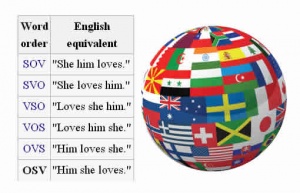Difference between revisions of "Language/Multiple-languages/Grammar/Various-word-orders-in-various-languages"
< Language | Multiple-languages | Grammar
Jump to navigation
Jump to search
(→SOV) |
|||
| Line 8: | Line 8: | ||
'''There can be more than one order in a language, the listed are just the most common cases.''' | '''There can be more than one order in a language, the listed are just the most common cases.''' | ||
{| class="wikitable" | {| class="wikitable" | ||
! colspan="2" |SOV | |||
|- | |||
!Language | !Language | ||
!Example sentence 1 | !Example sentence 1 | ||
| Line 25: | Line 25: | ||
|Turkish | |Turkish | ||
|<span style="color:green">Iki</span> <span style="color:blue">büyük</span> <span style="color:indigo">beyaz</span> <span style="color:violet">bina</span> <span style="color:orange">görd</span><span style="color:red">üm</span>. | |<span style="color:green">Iki</span> <span style="color:blue">büyük</span> <span style="color:indigo">beyaz</span> <span style="color:violet">bina</span> <span style="color:orange">görd</span><span style="color:red">üm</span>. | ||
| | |- | ||
! colspan="2" |SVO | |||
= | |- | ||
!Language | !Language | ||
!Example sentence 1 | !Example sentence 1 | ||
| Line 58: | Line 57: | ||
|Spanish | |Spanish | ||
|<span style="color:orange">Vi</span> <span style="color:green">dos</span> <span style="color:blue">grandes</span> <span style="color:violet">edificios</span> <span style="color:indigo">blancos</span>. | |<span style="color:orange">Vi</span> <span style="color:green">dos</span> <span style="color:blue">grandes</span> <span style="color:violet">edificios</span> <span style="color:indigo">blancos</span>. | ||
| | |- | ||
! colspan="2" |VSO | |||
= | |- | ||
!Language | !Language | ||
!Example sentence 1 | !Example sentence 1 | ||
| Line 70: | Line 68: | ||
|Welsh | |Welsh | ||
|<span style="color:orange">Gwel</span><span style="color:red">ais</span> <span style="color:green">ddau</span> <span style="color:violet">adeilad</span> <span style="color:blue">mawr</span> <span style="color:indigo">gwyn</span>. | |<span style="color:orange">Gwel</span><span style="color:red">ais</span> <span style="color:green">ddau</span> <span style="color:violet">adeilad</span> <span style="color:blue">mawr</span> <span style="color:indigo">gwyn</span>. | ||
| | |- | ||
! colspan="2" |VOS | |||
= | |- | ||
!Language | !Language | ||
!Example sentence 1 | !Example sentence 1 | ||
| | |- | ||
! colspan="2" |OSV | |||
= | |- | ||
!Language | !Language | ||
!Example sentence 1 | !Example sentence 1 | ||
| | |- | ||
! colspan="2" |OVS | |||
= | |- | ||
!Language | !Language | ||
!Example sentence 1 | !Example sentence 1 | ||
Revision as of 18:50, 23 June 2017
This lesson is about word orders, which can be mainly divided into six types, with small differences inside each type. Here are some examples.
S means subject, O means object, V means verb.
SOV and SVO are the most popular, accounting for about 4/10 each.
There can be more than one order in a language, the listed are just the most common cases.
| SOV | |
|---|---|
| Language | Example sentence 1 |
| Japanese | 私は2つの大きな白い建物を見た。 |
| Korean | 나는 2 개의 큰 하얀 건물을 보았다. |
| Persian | .من دو ساختمان بزرگ سفید دیدم |
| Turkish | Iki büyük beyaz bina gördüm. |
| SVO | |
| Language | Example sentence 1 |
| Chinese | 我看到了两座白色大楼。/我看到了兩座白色大樓。 |
| English | I saw two big white buildings. |
| Esperanto | Mi vidis du grandajn blankajn konstruaĵojn. |
| French | J'ai vu deux grands bâtiments blancs. |
| German | Ich sah zwei große weiße Gebäude. |
| Itanlian | Ho visto due grandi edifici bianchi. |
| Portugese | Eu vi dois grandes edifícios brancos. |
| Russian | Я увидел два больших белых здания. |
| Spanish | Vi dos grandes edificios blancos. |
| VSO | |
| Language | Example sentence 1 |
| Irish | Chonaic mé dhá fhoirgneamh bán mór. |
| Welsh | Gwelais ddau adeilad mawr gwyn. |
| VOS | |
| Language | Example sentence 1 |
| OSV | |
| Language | Example sentence 1 |
| OVS | |
| Language | Example sentence 1 |
